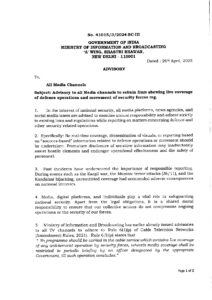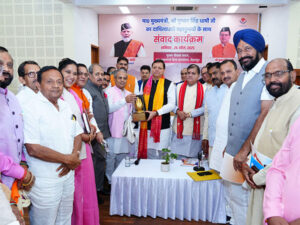Govt upbeat on constructing model cooperative villages across country: Home Minister Amit Shah
Ahmedabad (Gujarat) [India], January 9 (ANI): The government is going all out to construct Model Cooperative Villages across the country, Union Minister of Home and Cooperation Amit Shah has said.

The Model Cooperative Village (MCV) programme is being implemented in Gujarat on a pilot project basis and its implementation across the country will be considered, based on the outcome of the pilot project, he said.
The MCV programme is being jointly implemented by the National Bank for Agriculture and Rural Development (NABARD) and the Gujarat State Cooperative Bank (GStCB).
It was launched on April 10, 2022 at Bavla village of Ahmedabad district in Gujarat. The programme is also being piloted in six selected villages of Gujarat, which are Adroda and Rethal (Ahmedabad), AdarajMoti and IsanpurMota (Gandhinagar), Pipero (Dahod) and Kolithad (Rajkot), by NABARD in close coordination with various stakeholders.
The aim of the MCV programme is to create ‘Atmanirbhar Gaon’ (self-reliant villages) through the vision of ‘Sahakaar se Samridhi’, the Union minister said.
The objective is to adopt a Primary Agricultural Credit Societies (PACS) centric, household-oriented approach to ensure the provision of livelihood opportunities to at least two members of each household, aiming at enhancing the production per unit per establishment, he said.
Implementation of the programme in other states would be considered by NABARD after studying the outcome of the pilot projects in Gujarat, he added.
The NABARD is playing a pivotal role in coordination between different stakeholders such as the Government of Gujarat, Cooperative Banks (GStCB/ DCCBs), Community-Based Organizations (CBOs), etc., in facilitating saturation of all possible eligible schemes and initiatives of the Government and other stakeholders, the Cooperation Minister said.
Earlier in 2022, Prime Minister Narendra Modi said, “Co-operation is also a very big medium of self-reliance in the village. It has the energy of a self-reliant India.”
The MCV has been designed to overcome development challenges by adopting a bottom-up approach.
The outlined objectives of the MCV are: to achieve faster and more inclusive growth through infrastructure development, livelihood promotion, health and education, banking and insurance services, and delivery of public services using a bottom-up approach.
Secondly, to take governances to the doorstep of the people by enhancing the outreach of programmes through a cadre of trained volunteers and champions in administration.
Thirdly, to improve the quality of delivery mechanism by the convergence of programmes and coordination among frontline workers, PRI representatives and community resource persons/volunteers. Fourthly, to generate awareness about the government programmes among the people in rural areas.
Finally, to enhance transparency and accountability by promoting legal literacy and understanding of rights and entitlements under various laws like the Right to Education Act, 2009, Forest Rights Act, 2006 (Scheduled Tribes and Other Traditional Forest Dwellers(Recognition of Forest Rights) Act, National Food Securities Act, 2013.






